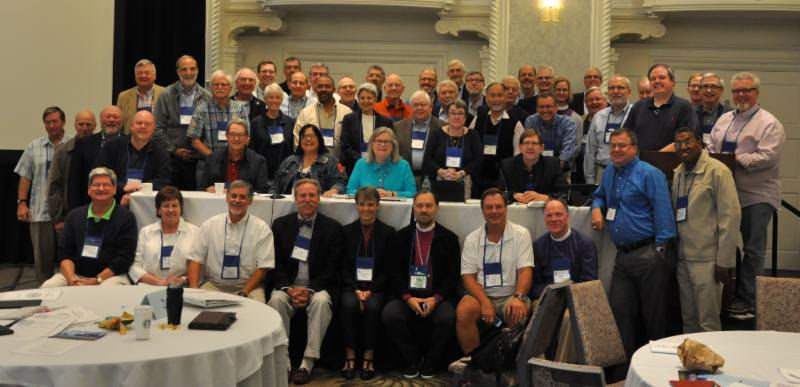A task force studying the ministry of bishops is working on “What does the church in 2017 need in bishops?” The Task Force on the Episcopacy was established by Resolution D004 of the 2015 General Convention.
“There is a confluence of issues influencing our work,” says the Very Rev. Gary Hall, a retired dean of Washington National Cathedral who serves on the task force’s canonical issues sub-committee. “Heather Cook and the lack of disclosure to the electing body is one. Another is figuring out what we need to do to make sure that we don’t have a pattern of bishop elections with diverse slates, but not diverse results. And the third is clarifying to whom the bishop formation process is accountable.”
Bishop Ian Douglas of Connecticut, a four-time deputy before his election as bishop in 2009, chairs the task force. “Everyone who’s on this task force is committed to the Episcopal Church being episcopally led and synodically governed,” he says. “We’re asking how we can support bishops to be the best leaders they can be.”
The canons, say both Douglas and Hall, are at the heart of the task force’s work. “What do they say and where do they conflict with current practice? We have some extracanonical practices out there,” Douglas says, referring to the appointment of assisting bishops, which are not included in the church’s canons, and the election of bishops over age 72, the mandatory retirement age, to serve as bishops provisional. “We’d like clarity around canonical boundaries, and also to understand how the canons can encourage bishops to be healthy, whole and collaborative leaders in the new church and world.”
“We need to enforce the existing canons or change the canons,” Hall says. The task force may propose legislative resolutions to General Convention, canonical changes, or administrative guidance on how dioceses can conform to the canons, he says. “We might think about proposing models that don’t exist now, and there might be things happening that aren’t kosher according to the canons, but that General Convention might proactively want to make possible.”
A major topic of discussion was the issue of mentoring and formation for those discerning a call to the episcopacy, an idea that created something of social media storm when it was first proposed:
While much of the online conversation centered on the fear that current bishops were trying to restrict the pool of potential future bishops, the proposal, says task force member Alexandra Killenwald, intends just the opposite.
The idea under consideration, she says, is based on research about the kinds of structures that can help facilitate better representation of women and people of color in leadership. Killenwald, who chairs the task force’s working group on diversity, is professor of sociology at Harvard University and junior warden at Christ Episcopal Church in Waltham, Massachusetts.
Research indicates that when women and men look at the same job advertisements to see if they’re qualified, women hold themselves to a higher standard than do men, she says. A professional development and mentoring program would be “a way to say to women and people of color, hey, let’s just try this out, and see how it goes.
“If you can choose to participate in this program,” Killenwald says, “it would provide an entry point that gives folks a way to get experience and to explore a career calling and questions about being a bishop more generally” before discerning a call to a particular diocese….
The other topic discussed was the issue of diversity in Episcopal elections.
The motivation for seeking diversity in the House of Bishops is both practical and justice-oriented, Killenwald says. “Sometimes when we talk about diversity, we think that the goal is that the bishops should match the church’s demographics. But the motivation for diversity is not just about representation. There is research that suggests that diverse groups make better decisions, and that’s independent from how many people in the church have a particular attribute.
“It’s not about how many women bishops or bishops of color is enough. We don’t know what number is enough, but we’re pretty sure that it’s more than we have now, and the fact that people are missing is a function of discrimination—some in the church, and some in the broader social systems that keep some people from even walking through doors of Episcopal Church.”

